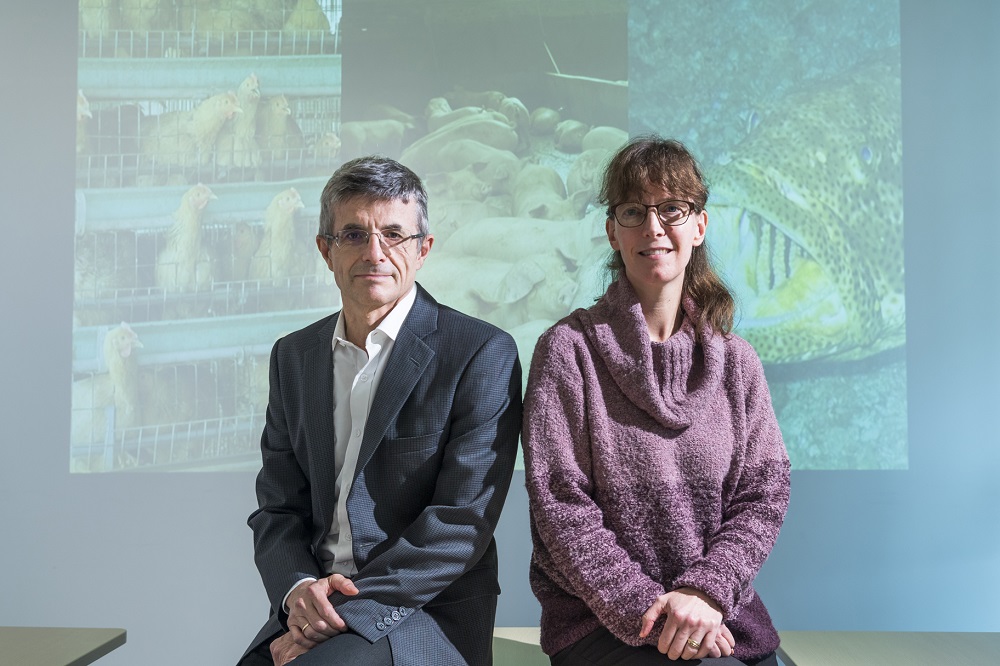One Health Approach to Prevent Another Pandemic

While the world is still trying to cope with the Covid-19 pandemic, Professor Dirk Pfeiffer, Chow Tak Fung Chair Professor of One Health at the Jockey Club College of Veterinary Medicine and Life Sciences (JCC) and Director of the Centre for Applied One Health Research and Policy Advice (OHRP), warned that the next pandemic could be even worse. The whole world must learn the lessons from the current pandemic, and one of them is that we need to adopt the “One Health” approach to better manage and ideally prevent such pandemics, and to deal more effectively with other global human, animal and environmental health issues, he said.
“One Health is not just about medics working together with vets and virologists. It needs to be based on a truly interdisciplinary approach to research and policy development, which means generating integrated knowledge by bringing together different scientific disciplines, including the social sciences,” emphasised Professor Pfeiffer, who is a veterinary epidemiologist and has provided scientific expertise to international organisations and governments, including the World Organisation for Animal Health and the Food and Agriculture Organization of the United Nations. “There are many ways to control a pandemic, but a key driver is human behaviour,” he said.
Wet market issues: social science perspective
He mentioned wet markets as an example. Wet markets with different livestock and poultry species being freshly slaughtered and sold are regarded as a hotbed for new infectious diseases associated with animal-human transmission, he said. These include severe acute respiratory syndrome (SARS), avian flu (H5N1 and H7N9) and the current Covid-19. “But why do people still prefer to buy raw meat from wet markets? Is it based on a traditional cultural perception or fresh meat tasting better? How can you manage changes in people’s behaviour? To understand this better we need to adopt social science approaches,” he explained.
With the establishment of the JCC and the OHRP, Professor Pfeiffer believes CityU can contribute by improving our understanding of what the drivers of infectious disease emergence are and recommending interventions using the “One Health” approach to reduce the risk of future pandemics.
AMR: another global threat
Antimicrobial resistance (AMR) is another pressing issue that he thinks needs to be addressed using the “One Health” approach. The World Health Organization declared AMR one of the top 10 global public health threats facing humanity. The misuse and overuse of antimicrobials, as well as poor infection and disease prevention and control in healthcare facilities and livestock production, are some of the main drivers in the development of AMR.
“For both humans and animals, antimicrobials should be used only for treating clearly identified bacterial diseases, but not for prevention,” explained Professor Pfeiffer. “Otherwise, as drug-resistant pathogens continue to spread, we will have more and more infections that are untreatable using currently available antibiotics. And it is unlikely that new antibiotics will become available in the short to medium term.”
With support from the Sustainable Agricultural Development Fund, Professor Pfeiffer is leading two research projects to improve pig and poultry health and production in Hong Kong. One of the key missions of these projects is to help local pig and poultry farmers reduce the use of antimicrobial drugs. The team works with farmers to develop an understanding of each farm’s drug usage and the antimicrobial resistance level, so that the team’s veterinarians can prescribe effective medications for pigs and poultry, when such treatment is required.
Providing clinical services for pig, poultry and fish farms
The pig and poultry veterinary teams provide professional clinical services for farms and take samples of serology from pigs and poultry during their regular visits. By producing reports on the productivity of each farm and the level of different infectious diseases, farmers can make strategic decisions about health and production management. The veterinary teams provide tailor-made advice to farmers in these areas, which can include more effective control of temperature and ventilation, and strengthen farm biosecurity to prevent diseases and other pests from entering the farms.
“Our teams are dedicated to improving farmers’ biosecurity awareness and strengthening their animal husbandry and general farm management knowledge so that we can reduce their reliance on antimicrobials,” he said. “While we realise that it will take time to change mind-sets and behaviours, our collaboration with farmers during the past one and a half years has shown us that it will be possible to develop sustainable pig and poultry farming in Hong Kong without having to compromise the health of humans, animals or the ecosystem.”
In addition, Professor Sophie St-Hilaire, Professor of Aquatic Animal Health at the JCC and a member of the OHRP, is leading a project to provide veterinary diagnostic and disease-prevention services for marine fish and pond fish culture operators in Hong Kong, with support from the Sustainable Fisheries Development Fund (SFDF). The fish team has established a pharmacy for fish farmers to purchase medications for fish under the supervision of the team's veterinarians. They evaluated the purity of antibiotics commonly used in fish farms in Asia and found emamectin benzoate, an insecticide, can be an effective alternative treatment for reducing the level of sea lice in fish farms in Hong Kong.
With another round of funding from SFDF, they are moving to the second phase of the project, continuing to improve the sustainability of the Hong Kong aquaculture industry by increasing the fish health veterinary capacity regionally, preventing infectious disease spread, and addressing key limitations the industry facing through applied research and outreach.
This research article originated from CityU RESEARCH.
